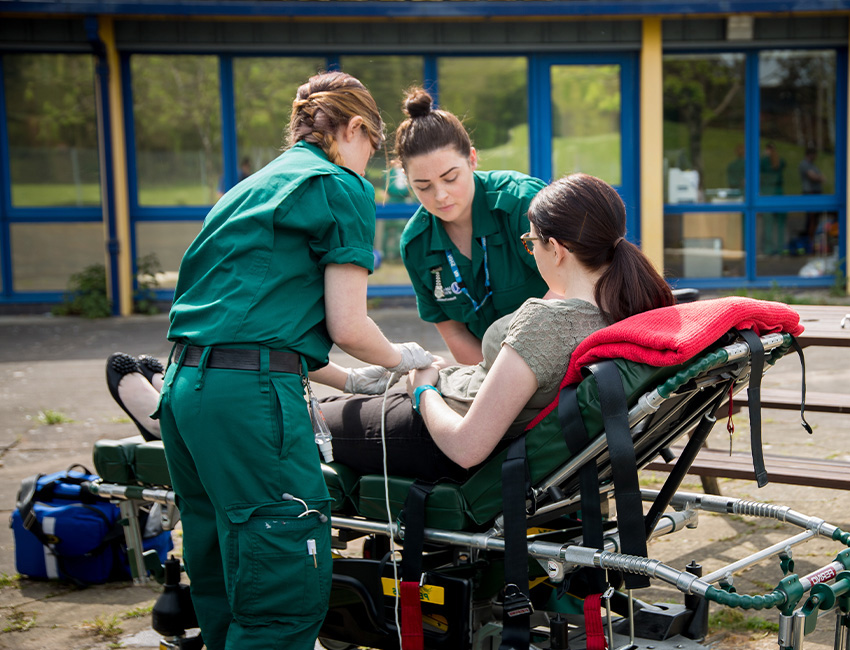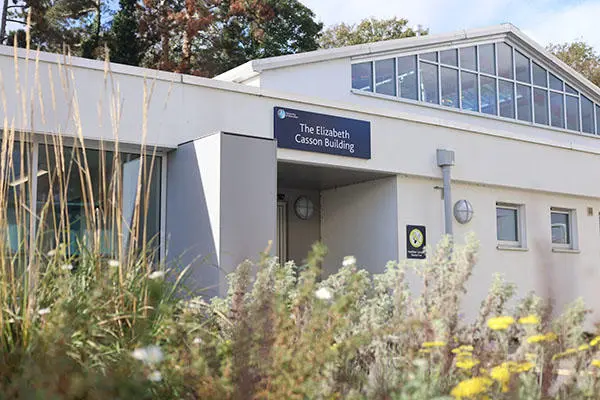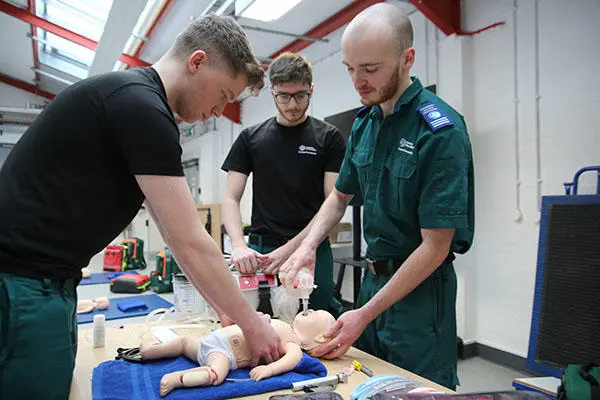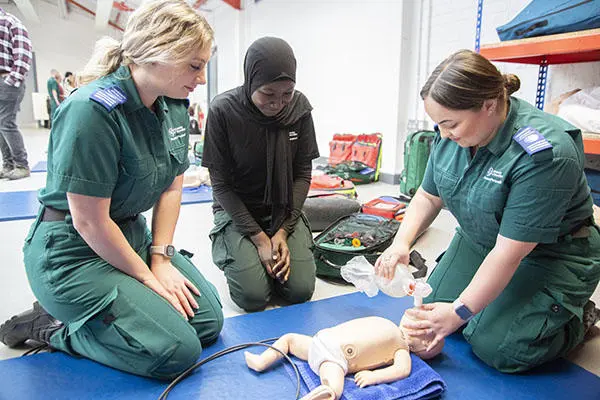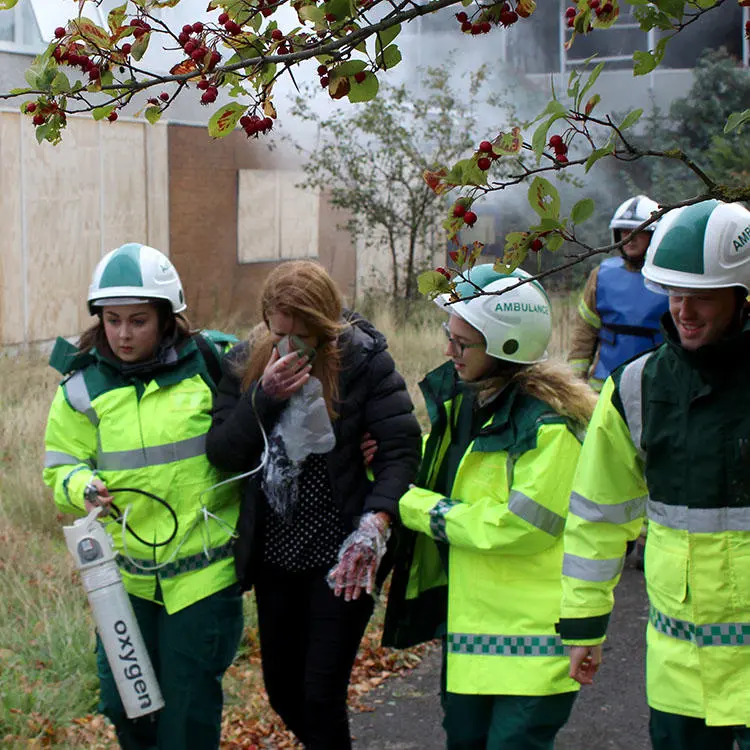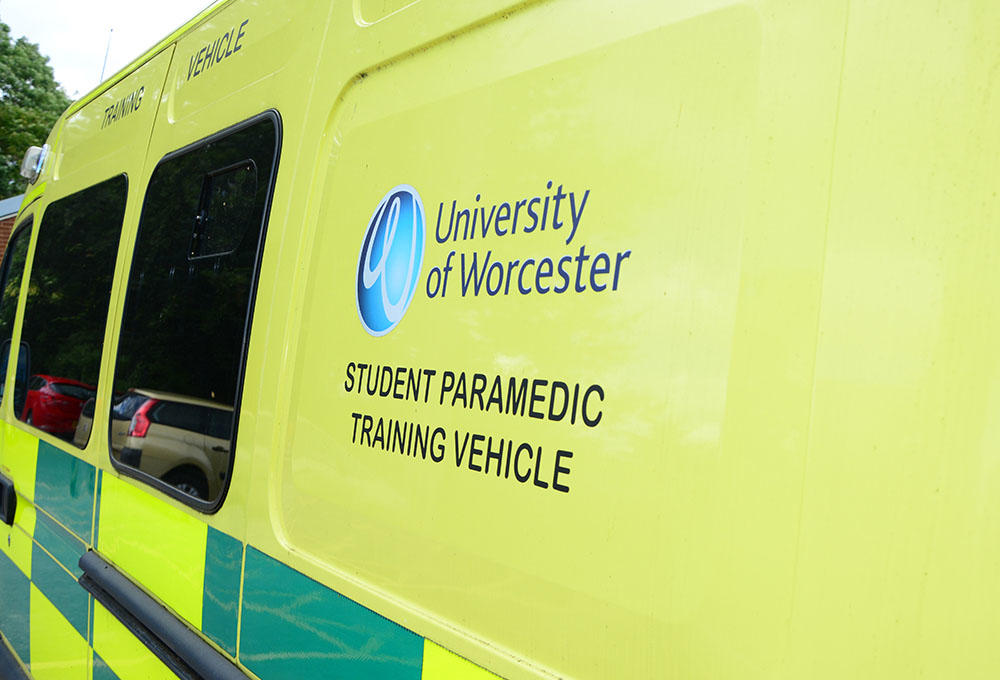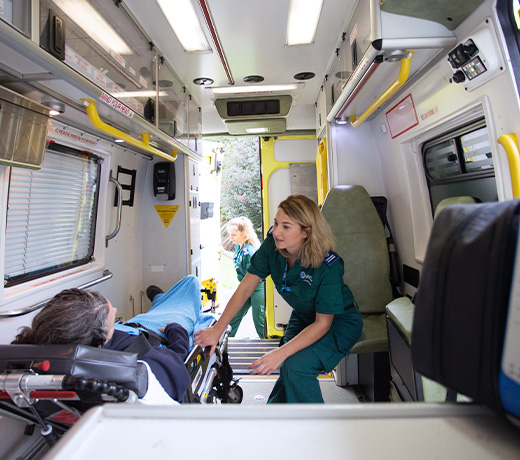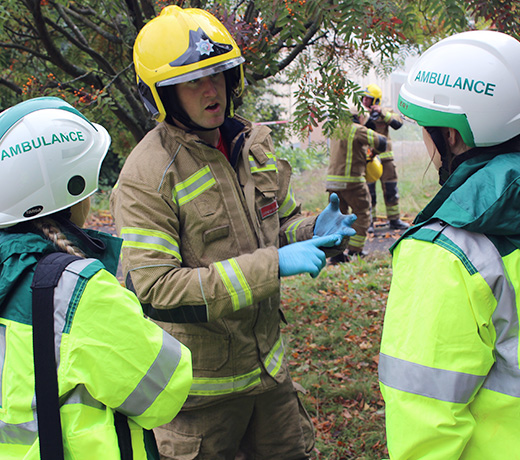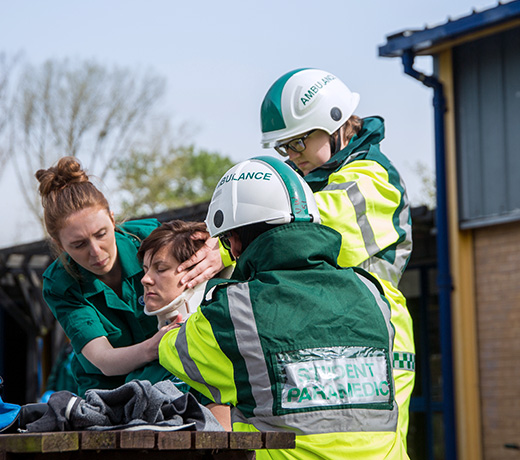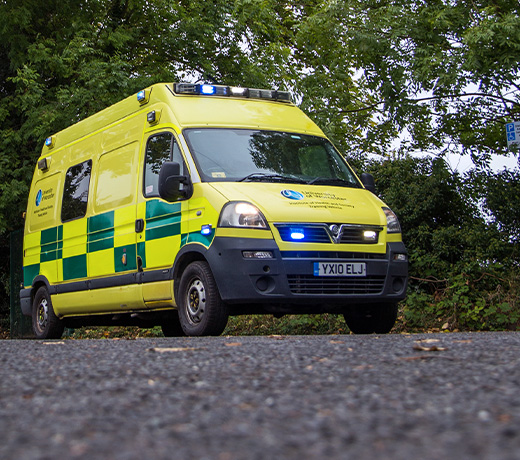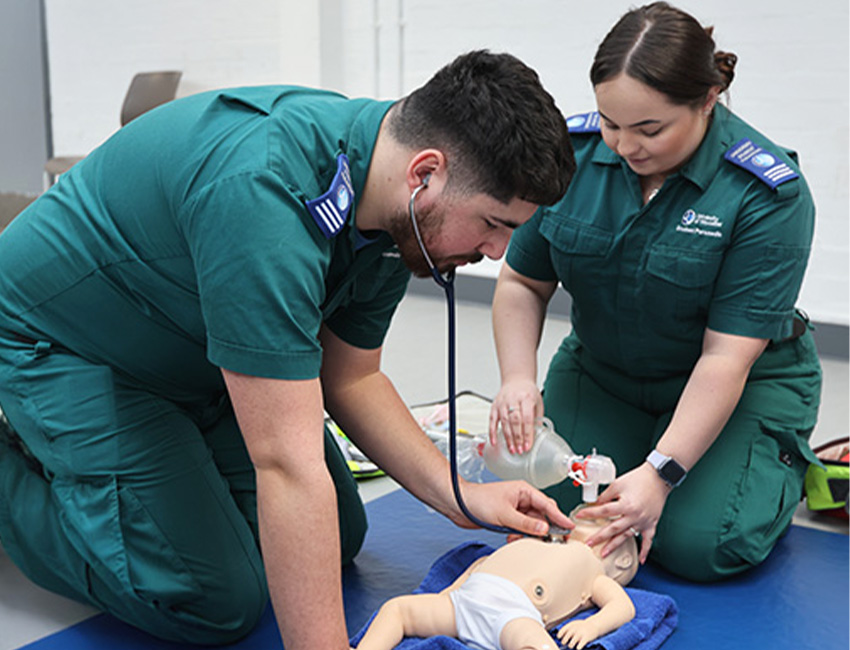Created in partnership with the West Midlands Ambulance Service, our Paramedic Science degree includes 1,200 hours of placement. Learning from our team of experienced staff, you’ll have plenty of opportunities to hone your biomedical knowledge and problem-solving skills before you graduate.
grant that you won't need to pay back
Our Paramedic Science degree is fully approved by the HCPC so when you graduate, you can apply to register as a paramedic.
University of the Year finalist
Recognised for our graduate success, we’re shortlisted for University of the Year in the Times Higher Education Awards 2025.
Overview
We’ll teach you how to be able to think critically, react appropriately in challenging situations and be an effective communicator, all alongside building the knowledge and skills to deliver immediate healthcare and support to patients of all ages. You’ll graduate as a confident, competent paramedic ready to work in NHS or private ambulance services.
You’ll have lots of opportunities to prepare for placements through skill sessions. These hands-on sessions take place in our simulation suites, where you can access the specialist equipment you’ll be working with when you qualify. You’ll practice different techniques with a range of simulation manikins and learn from real service users and experienced paramedics. We also have a fully equipped emergency ambulance vehicle, accommodating small group teaching on the move.
You’ll also be assigned a Personal Academic Tutor when you join us. Typically a member of your teaching team, your tutor will remain with you throughout your time at Worcester. They’ll get to know your strengths and where you can develop, offering personalised support and feedback throughout your course.
Placements
Our excellent links with the West Midlands Ambulance Service means that we work with them for many of our placements. This is complemented by experience in a range of other settings, including nursing homes, the primary care emergency department, paediatrics, and palliative care settings.
Course content
On this accredited course you’ll study theories backed up by substantial evidence, and then get the opportunity to apply this learning in professional practice.
We regularly review our courses to reflect the latest research and developments in the subject area, as well as feedback from students, employers and the wider sector. As a result, modules may change to ensure the course remains current and relevant.
All modules are mandatory to ensure you’re eligible to register as a paramedic with the HCPC.
Careers
This course is fully approved by the Health and Care Professions Council (HCPC) so when you graduate, you’ll be able to register with them as a paramedic.
HCPC registration means that can apply for opportunities in NHS ambulance services, private ambulance services and an increasing range of other healthcare environments.
This qualification is also recognised in many countries around the world, opening the doors to work in overseas healthcare settings.
Course highlights
Teaching and assessment
Our course creates career-ready graduates through applied experiences. You’ll be taught via interactive lectures and seminars, and complete practical sessions in the classroom and on professional placement.
Your assessments will help prepare you for your career as a paramedic, and include assessed observations, reflective essays, presentations, group discussions and portfolios of evidence.
Teaching and assessment contents
Teaching resides in three domains of the curriculum: theory, skills and simulation and practice learning. All three domains of teaching aim to encourage and support you to take responsibility for your own learning, and to become increasingly independent and autonomous in your academic and professional development. This approach further seeks to foster an understanding and adoption of a lifelong approach to learning, firmly embedded in professional practice. Teaching is fundamental in attaining this realisation through the integration of the domains of the curriculum with clearly defined relationships within and across academic years.
Theoretical modules provide the underpinning knowledge and intellectual skills as a foundation for both practice and academic development. Teaching adopts a blended, approach combining face-to-face, on-campus learning with synchronous and asynchronous teaching sessions to create a stimulating, flexible and exciting learning experience for you. Formal lectures and seminars are complemented by a ‘flipped classroom’ approach, a blended learning strategy that reverses traditional learning. It is an active learning approach that requires you to complete a range of pre-reading of key information provided via the VLE, prior to attending lectures, which then forms the basis of in-class discussion, activities, and projects. Attendance is mandatory at specific teaching sessions, with a health and safety or patient safety focus, for example, moving and handling, conflict resolution, basic, intermediate, and advanced life support, and trust induction. A clear indication of these sessions will be provided in the module outlines.
Simulation modules provide the bridge between theory and practice. They are designed to enable you to understand and interpret the application of theory in a safe practice environment. Simulation allows you to discover ways in which the theory helps you to solve real-world problems, engage in clinical reasoning and develop practical skills in a safe and supportive environment. In these modules, you broaden you learning opportunities and experience, being able to take risks, make mistakes, evaluate alternative approaches to patient management and hone skills in a safe learning environment. It also allows you to address you learning needs which cannot be assured in the opportunistic learning environment provided in the practice placement modules. Simulation will be undertaken in environments as close to reality as possible, utilising volunteers, service users and mannikins as simulated patients. This approach allows you to engage in experiential learning closely aligned to you levels of knowledge and experience as well as preparing you for undertaking you placements. Simulation will enhance you competence and confidence; it also promotes and develops a sense of professionalism.
In addition, meetings with Personal Academic Tutors are scheduled on at least four occasions in the first year and three occasions in each of the other years of a course. You will be able to access tutorials with the module team and final-year dissertation supervision.
The University places emphasis on enabling you to develop independent learning capabilities that will equip you for lifelong learning and future employment, as well as academic achievement. A mixture of independent study, teaching and academic support from Student Services and Library Services, and the Personal Academic Tutoring system enables you to reflect on progress and build up a profile of skills, achievements and experiences that will help you to flourish and be successful.
This BSc (Hons) Paramedic Science programme is a professional course requiring a minimum of 1200 hours of practice learning. You spend 240 hours in practice placements in year 1 with 480 hours in years 2 and 3. Across the programme, you complete 5 practice learning modules, one in year 1, two in year 2 and two in year 3 to ensure alignment and integration between theory, simulation and placement. Practice education takes the form of short block placements interspersed by theory blocks, allowing theory to be aligned to practice enabling authentic learning.
Practice placements are predominately undertaken with West Midlands Ambulance Service NHS Foundation Trust but are complemented by experiences in a range of other settings; for example, residential/nursing homes, primary care emergency department, maternity, mental health, paediatrics, and palliative care placements. The Practice Assessment Document (PAD) for each practice module identifies the academic level you are at, the teaching that has taken place and the expectations of you during that module. This provides a clear focus for teaching and learning for both you and the practice educator. Cumulatively the practice documents allow the you and practice educator to see progression and provide clear insight into additional learning needs and areas for development. Learning opportunities can then be tailored to your particular needs.
The practice element of learning is supported by the practice educator within real-world clinical environments. During placements, you receive direct support and guidance from your practice educator and other supervising healthcare professionals, including coaching as well as mentoring.
Meet the team
Case studies
Entry requirements
UCAS tariff points required: 120
Plus GCSE English and Maths at grade C/4 or above. University of Worcester GCSE Maths and English equivalency tests are also accepted. Please note that Functional Skills Level 2 Maths and English are not accepted.
UCAS tariff points can come from:
- A-levels (BBB). 120 points must be achieved in A2 subjects or equivalent, with at least 1 subject being a science subject from: Biology, Chemistry, Physics, Sociology, Psychology or Physical Education (P.E.)
- BTEC Extended National Diploma (Sport & Exercise Science, Health Science and Applied Science preferred) DDM. Other BTEC National Diplomas may be considered with AS or A2 Biology/Human Biology/PE. We will not be accepting Uniformed Public Service (or equivalent)
- Irish Leaving Certificate: 3A and 3B grades in 6 Higher Level papers at one sitting, including 2 science subjects of which one should be Biology
- Access to Higher Education Diploma welcomed - 60 credits in total, with a minimum of 45 credits at Level 3 - at least 24 credits at Distinction and the remainder at Merit, at least 15 of those in Biological Science related subjects. Preferred courses include Health and Social Care, Health Professionals or similar.
- T-Levels may be used to meet the entry tariff requirements for this course. Find out more about T levels as UCAS tariff points here.
Other additional qualifications may be considered. Work out your estimated points with the UCAS tariff calculator.
Any questions?
If you have any questions about entry requirements, please call our Admissions Office on 01905 855111 or email admissions@worc.ac.uk.
Fees
Fees contents
UK and EU students
In 2026/27 the standard fee for full-time home and EU undergraduate students on BA/BSc/LLB degrees and FdA/FdSc degrees is £9,790 per year.
Tuition fees are reviewed annually and may increase each year for both new and continuing students.
For more details on course fees, please visit our course fees page.
International students
In 2026/27 the standard tuition fee for full-time international students enrolling on BA/BSc/LLB degrees and FdA/FdSc degrees is £17,200 per year.
Tuition fees are reviewed annually and may increase each year for both new and continuing students.
For more details on course fees, please visit our course fees page.
How to apply
How to apply contents
Applying through UCAS
UCAS is the central organisation through which applications are processed for full-time undergraduate courses in the UK.
Read our how to apply pages for more information on the application process, or if you’d like to apply for part-time study.
Paramedic Science BSc (Hons) - B950
Contact
If you have any questions, please get in touch. We're here to help you every step of the way.

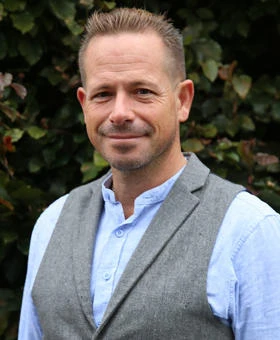
Admissions Office
admissions@worc.ac.uk01905 855111More to explore
Open Days
Visiting us is the best way to get a feel for student life at the University of Worcester.

The City of Worcester
Worcester is a welcoming university city with great transport links and plenty of student parking.

Accommodation
Benefit from our accommodation guarantee. We have rooms on campus to suit every budget including en-suite options.

